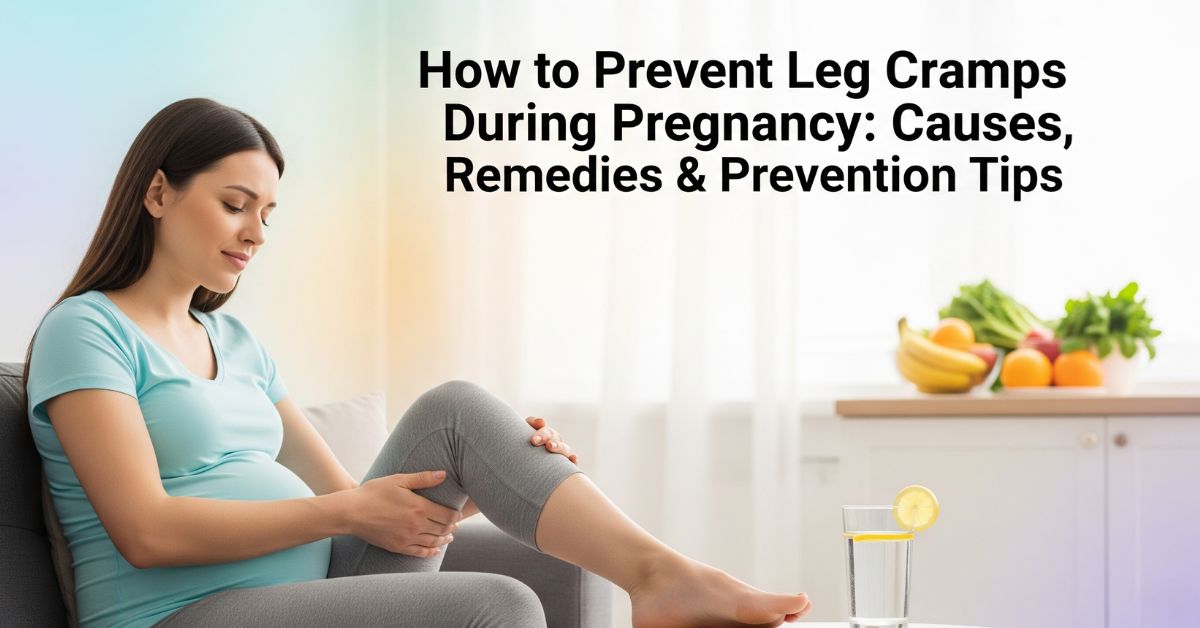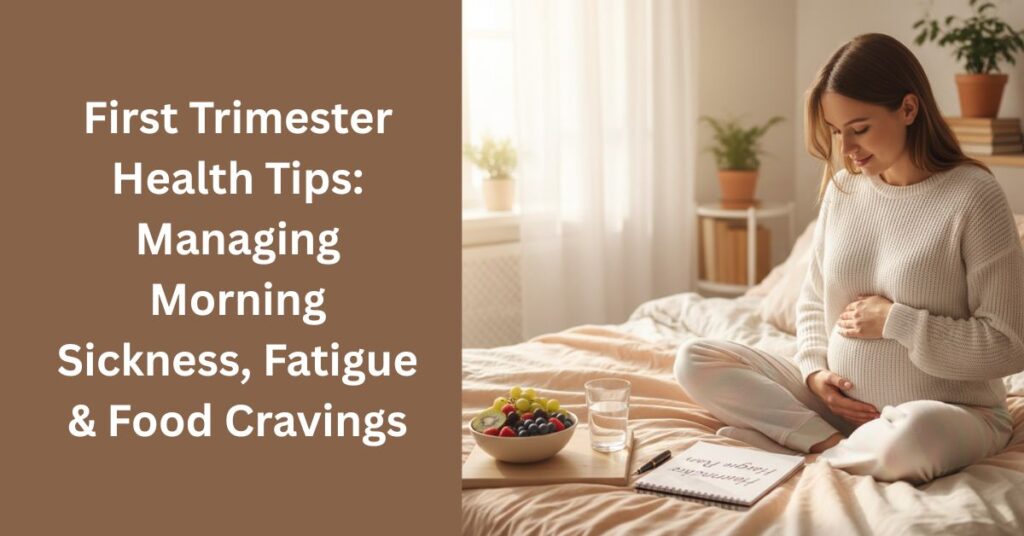Currently Empty: $0.00
How to Prevent Leg Cramps During Your Pregnancy

Leg cramps during pregnancy are among the most common discomforts women experience, particularly in the second and third trimesters. These sudden, painful spasms, often striking in the calf muscles at night, can disturb sleep and interfere with daily routines. While the exact cause is not fully known, factors such as hormonal changes, dehydration, increased weight, and deficiencies in key minerals like calcium, magnesium, and potassium are believed to contribute.
The reassuring news is that pregnancy leg cramps are generally harmless and can be managed effectively. With the right combination of dietary adjustments, hydration, safe exercises, and simple lifestyle changes, expectant mothers can significantly reduce both the frequency and intensity of these cramps, leading to a more comfortable pregnancy journey.
Contents
What Causes Leg Cramps During Pregnancy?
Leg cramps can be triggered by multiple factors, such as:
- Electrolyte Imbalance: A lack of essential minerals like calcium, magnesium, and potassium can disrupt normal muscle function, leading to painful cramps. These minerals play a key role in muscle relaxation and nerve signaling, making a balanced diet crucial during pregnancy.
- Poor Blood Circulation: As your uterus grows, it puts extra pressure on the veins in your legs, slowing circulation. Reduced blood flow can make muscles more prone to cramping, especially at night when you’re lying down.
- Dehydration: Not drinking enough fluids can cause the muscles to tighten and contract involuntarily, resulting in leg cramps. Staying hydrated is especially important during pregnancy to support both your body and your baby’s development.
- Excess Phosphorus Intake: Processed foods, junk snacks, and sodas are often high in phosphorus, which can interfere with calcium absorption. This imbalance may trigger cramps and also affect your overall bone health.
- Weight Gain and Muscle Fatigue: With the natural weight gain of pregnancy, your leg muscles carry more strain than usual. This extra pressure can cause muscle fatigue, increasing the likelihood of cramps, especially later in pregnancy.
- Sleeping Positions: Certain sleeping positions may restrict blood flow to the legs, leading to cramps and discomfort. Elevating your legs slightly or using a pregnancy pillow can help improve circulation and reduce these nighttime spasms.
Effective Ways to Prevent Leg Cramps During Pregnancy
1. Eat Iron-Rich Foods
Iron plays a crucial role in maintaining healthy blood circulation and oxygen supply, which helps reduce muscle fatigue and prevent cramps. Include spinach, beetroot, pomegranates, lentils, chickpeas, lean red meat, and fortified cereals in your pregnancy diet. An iron-rich diet also supports your baby’s growth and helps prevent anemia, a common concern during pregnancy.
2. Increase Calcium Intake
A calcium deficiency can make cramps worse. Add milk, tofu, green leafy vegetables, almonds, and fish to your meals. Calcium not only keeps muscles strong and prevents spasms but also supports your baby’s bone and teeth development. Aim to include at least one calcium-rich food in every meal.
3. Stretch Before Bedtime
Leg cramps often strike at night. Doing gentle calf stretches before sleeping can relax tight muscles and reduce nighttime cramps. Consistent stretching improves circulation and flexibility, making it easier to manage body changes during pregnancy. Even a 5-minute stretching routine can make a noticeable difference.
4. Stay Active but Avoid Prolonged Standing
Simple exercises like walking or prenatal yoga improve circulation. Avoid standing for long periods, crossing your legs, or wearing high heels. Light activity throughout the day prevents stiffness, while rest breaks help relieve pressure on your legs. Always listen to your body and choose safe, low-impact movements.
5. Stay Hydrated
Drink plenty of water throughout the day. Dehydration can make cramps more frequent and intense. Keeping a water bottle handy and sipping regularly is an easy way to stay hydrated. Herbal teas, coconut water, and fresh fruits can also contribute to your fluid intake.
6. Limit Processed Foods & Sodas
Junk food and sodas are high in phosphorus, which can interfere with calcium absorption and trigger cramps. Opt for fresh, nutrient-dense meals instead. Choosing wholesome foods ensures that you and your baby get the right balance of nutrients. Cutting down on processed items also helps maintain healthy weight gain during pregnancy.
7. Sleep with Elevated Feet
Use a pillow to raise your legs slightly while sleeping. This promotes healthy blood circulation, prevents swelling, and reduces cramp risk. Elevating your legs also relieves pressure on the veins, making it easier for blood to flow back to the heart.
Home Remedies for Pregnancy Leg Cramps
- Massage the affected area when a cramp strikes.
- Apply a warm compress or take a warm shower to relax tight muscles.
- Switch to a cold pack if swelling is present.
- Practice prenatal yoga stretches under guidance.
- Along with preventive care, it’s a good idea to check out safe and reliable fetal monitoring devices for moms-to-be that can support you throughout pregnancy.
When to See a Doctor
Leg cramps are usually harmless, but you should consult your doctor if you notice:
- Severe, persistent cramps.
- Swelling, redness, or warmth in the legs.
- Pain that does not ease with rest.
These could be signs of deep vein thrombosis (DVT), which needs immediate medical attention.
Pregnancy Comfort Starts with Small Daily Habits
Leg cramps during pregnancy can be painful but are usually preventable with the right diet, hydration, stretching, and lifestyle changes. While leg cramps are usually harmless, it’s always a good idea to stay informed about your overall pregnancy health. Many moms also find reassurance in using at-home fetal monitoring devices to track their baby’s well-being. By making small daily adjustments, you can reduce cramps and enjoy a more comfortable pregnancy journey. Always consult your doctor before making major dietary or exercise changes.
FAQs About Leg Cramps During Pregnancy
- Are leg cramps during pregnancy normal?
Yes, they are very common, especially at night in the later stages of pregnancy. - What foods help reduce pregnancy leg cramps?
Foods rich in potassium (bananas, avocados), calcium (milk, almonds), and magnesium (nuts, whole grains) are most beneficial. - Can dehydration cause leg cramps in pregnancy?
Yes, dehydration is a major trigger. Drinking adequate water daily helps reduce cramps. - Are leg cramps harmful to the baby?
No, leg cramps usually do not affect the baby, but severe cramps should be discussed with a healthcare provider. - Can exercise help prevent leg cramps during pregnancy?
Yes, gentle stretching, walking, and prenatal yoga improve circulation and reduce the frequency of cramps.













